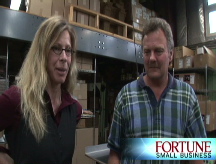When less means more
How smart entrepreneurs wring outsized profits from tiny organizations.

(Fortune Small Business) -- Business is booming for David Gao, owner of Arctic Food Services, a frozen-seafood distributor in St. Louis. His firm racked up $20 million in sales last year. But Gao still vented in a recent e-mail to FSB.
"I'm finding that I can manage myself better than I can manage a large number of people," he wrote. "Can you help me figure out how to run a business with high margins and few employees?"
Gao is not alone. A 2007 survey by Discover Financial Services (DFS) suggested that 69% of small-business owners would prefer to stay small. It's not just the risk of losing control: Top-line growth can also hurt your profits.
"Growth for the sake of growth isn't good; it's bottom-line performance that matters," says Eric Siegel, founder of Siegel Management, a consulting firm based in Bryn Mawr, Pa., and a lecturer at the University of Pennsylvania's Wharton School. "In many cases, you can make more money as a smaller firm."
It's also true that more employees equals more headaches. "The more you grow, the more administrative duties you take on," says Kristie Darien, executive director of the National Association for the Self-Employed in Washington, D.C.
In addition to the soaring cost of providing health insurance, which employees of bigger firms expect, larger companies must deal with a slew of labor and employment laws, ranging from the Americans With Disabilities Act, which affects companies with 15 or more employees, to the Family and Medical Leave Act, which kicks in once your employee headcount hits 50.
While most firms that employ fewer than 10 workers never crack $1 million in sales, there are exceptions - and they aren't just tech startups and hedge funds.
How do lean businesses outperform rivals with fatter payrolls? In 2006 the Georgia Institute of Technology studied the methods that forward-thinking small businesses use to maintain their competitive edge. Many of the most profitable small firms in the study favored strategic alliances, long-term contracts, close client relationships, and highly efficient manufacturing systems.
"Owners are redefining what it means to be an entrepreneur," says Traci Entel, a partner at Katzenbach Partners, a consulting firm in New York City. "They're outsourcing like never before and using partnerships and technology to expand."
Entel adds that the current economic slowdown has forced many business owners to reevaluate their expenses. "Companies that are overinvested in personnel are at the most risk," she says. Especially during a recession, lower staff costs can be a real competitive advantage. While large companies are usually forced to slash overhead by executing layoffs, their nimbler counterparts can evolve constantly.
"Businesses must be faster on their feet," says Siegel. "We're going to see more small firms that can easily dial up or down in their efforts and resources."
As evolving business models and technologies enable the growth of the microbusiness sector, more tiny companies are likely to achieve huge profits. FSB reader Gao, who now manages 20 employees, is still seeking the recipe that will allow him to join this small but growing club. "Our sales are strong, but I'm searching for a way to minimize my size and maximize my returns," he wrote.
We found four entrepreneurs who managed to crack that code. Here are their stories. ![]()
Outsized profits from tiny firms
Happy customers - and no service staff
Talent management software
Monitoring the staff pays off
When cutting costs means axing your friends
-
The Cheesecake Factory created smaller portions to survive the downturn. Play
-
A breeder of award-winning marijuana seeds is following the money and heading to the U.S. More
-
Most small businesses die within five years, but Amish businesses have a survival rate north of 90%. More
-
The 10 most popular franchise brands over the past decade -- and their failure rates. More
-
These firms are the last left in America making iconic products now in their twilight. More












